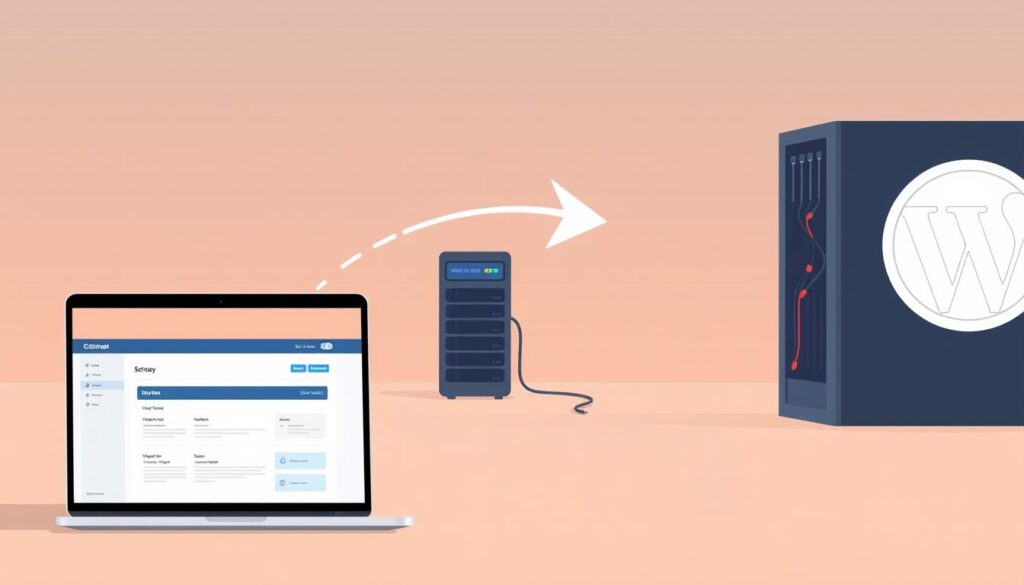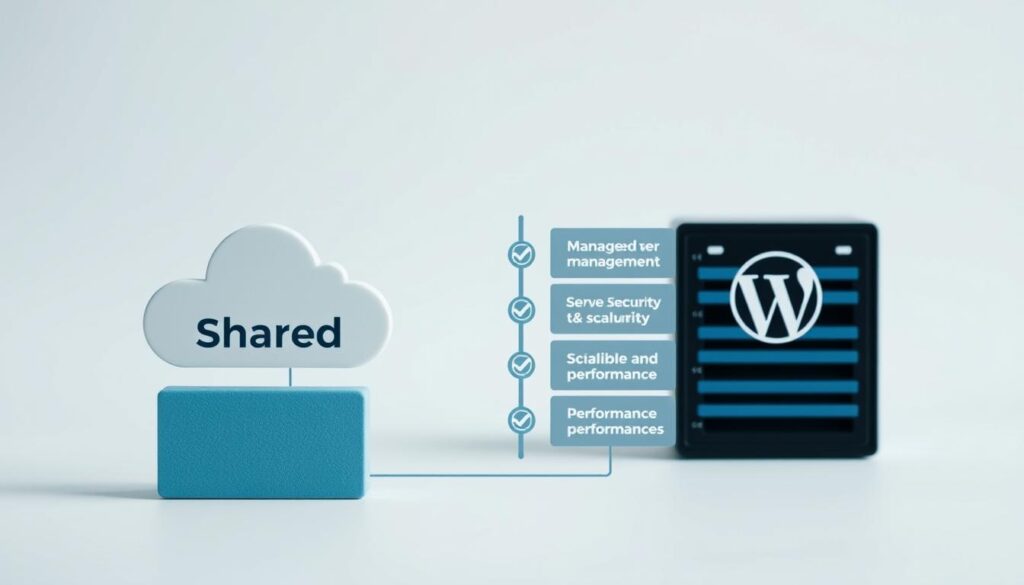Choosing a hosting plan can be hard. You have to pick between shared hosting and managed WordPress hosting.
A standard plan is cheap. But does it keep your site safe? Managed WordPress hosting has many features. But is it worth the extra cost?
Website owners often struggle to choose. They think about the good and bad of each option.
Key Takeaways
- Know the differences between shared and managed hosting.
- Look at the security each offers.
- Think about the cost of your choice.
- Check how well each performs and grows.
- See if you need a lot of support.
Understanding WordPress Hosting Fundamentals
WordPress hosting can seem complex. But knowing the basics is key for a great online site. It’s not just about storing files. It’s about making sure your site works well, is safe, and can grow.
What Makes WordPress Hosting Different
WordPress hosting is made just for WordPress sites. It has special features like easy installs and updates. This special hosting makes WordPress sites run better and safer, unlike regular web hosting.
The Importance of Choosing the Right Hosting Solution
Picking the right hosting is very important. It affects how fast your site loads, how often it’s up, and how users feel. A good host keeps your site running smoothly and fast. This makes visitors happy and helps your site rank better.
How Hosting Affects Website Performance
Hosting impacts your site’s speed and how well it works. A good hosting setup makes your site fast. But bad hosting can make it slow and cause problems.
Knowing these basics helps you choose the best hosting. The right hosting makes your site fast and user-friendly.
What Is Shared WordPress Hosting?
Shared WordPress hosting is simple and affordable. It lets many websites share one server. This server has things like CPU, RAM, and disk space.
Definition and Basic Characteristics
Think of shared hosting like living in an apartment with others. You have your own space (your website) but share things like water and electricity (server resources). It’s great for small to medium-sized websites or blogs.
How Shared Hosting Works
A single server is split into many virtual hosting accounts. Each account gets its own share of resources. Users manage their sites with a control panel from the hosting company. The company takes care of the server, security, and support.
Common Features of Shared Hosting Plans
Shared hosting plans have many features. These include:
- Email accounts
- Database management
- Control panel options like cPanel or Plesk
- 1-click WordPress installation
Control Panel Options
Most providers give a control panel. It lets you manage your hosting account. You can set up email, manage databases, and more.
Database Management
Shared hosting plans have tools for database management. This is key for dynamic sites that need databases for content and user info.
Knowing about shared WordPress hosting helps you decide if it’s right for your site.
What Is Managed WordPress Hosting?
Managed WordPress hosting is a special service for WordPress users. It gives top performance, security, and support. It’s perfect for businesses and people who need their WordPress site to work well.
Definition and Core Offerings
Managed WordPress hosting is a web hosting service made just for WordPress sites. The host takes care of technical stuff like server setup and security. This lets users focus on making content and growing their site.
How Managed Hosting Works
Managed WordPress hosting creates a special hosting space for WordPress. The host handles updates, security, and performance. This makes sure your WordPress site works well and fast.
Standard Features of Managed WordPress Plans
Managed WordPress hosting plans have many features to boost performance and security. Two main features are:
Automated Backups
Automated backups keep your WordPress site safe. They ensure your site can be restored quickly if something goes wrong. This gives users peace of mind.
WordPress-Specific Caching
WordPress-specific caching makes your site faster. It reduces load times by caching often-used resources. This improves the user experience a lot.
Managed WordPress hosting is a complete solution for WordPress users. It offers a safe, fast hosting space with expert support.
Shared vs Managed WordPress Hosting: Key Differences
Shared and managed WordPress hosting are different in many ways. Knowing these differences helps you choose the right hosting for your WordPress site.
Server Architecture Comparison
Shared hosting means many sites share one server. Managed WordPress hosting uses special servers just for WordPress. This can make your site faster and safer.
Managed WordPress hosts use cool tech like caching and CDNs to make your site run smoother.
Resource Allocation Differences
Shared hosting splits server resources among all users. Managed WordPress hosting gives you more control over resources. This helps your site perform better.
Management Responsibilities
With shared hosting, you manage your site yourself. Managed WordPress hosting takes care of updates, security, and backups. This saves you time.
WordPress Optimization Levels
Managed WordPress hosting is made just for WordPress. It has cool features like caching and performance boosts. Shared hosting can host WordPress too, but it’s not as optimized.
Knowing these differences helps you pick the best hosting for you. It depends on your needs and how tech-savvy you are.
Pricing Comparison: Shared vs Managed Solutions
When picking WordPress hosting, knowing the price difference is key. The cost affects your website’s budget and how well it works.
Typical Cost Structures for Shared Hosting
Shared hosting is cheaper, starting at $3 to $10 a month. It’s affordable because many users share the resources.
Pricing Models for Managed WordPress Hosting
Managed WordPress hosting costs more, from $15 to $50 or more a month. It’s worth it for the extra help and better site speed.
Understanding the Value Proposition
Managed WordPress hosting offers a smooth, fast site experience. It’s pricier but gives you security, speed, and expert help. This is great for businesses or busy sites.
Hidden Costs to Consider
There might be extra costs like for backups, SSL certificates, or extra support. Always check the pricing to avoid surprises.
| Hosting Type | Starting Price | Key Features |
|---|---|---|
| Shared Hosting | $3-$10/month | Shared resources, basic support |
| Managed WordPress Hosting | $15-$50+/month | Optimized performance, expert WordPress support, enhanced security |
Performance Analysis: Speed and Reliability
It’s important to know how shared and managed WordPress hosting differ. The right choice can make your website faster and more reliable. This affects how users see your site.
Loading Speed Comparison
Managed WordPress hosting is usually faster than shared hosting. This is because it uses special server settings and caching. For example, some use PHP 7.x and HTTP/2 for better speed.

Uptime Statistics and Guarantees
Uptime is key for hosting. Good hosts promise 99.9% uptime or more. But, uptime can differ between shared and managed hosting. Managed hosting often has better uptime because of its setup.
Traffic Handling Capabilities
Managed WordPress hosting is better at handling lots of visitors. It’s set up to handle sudden traffic well. This keeps your site fast, even when lots of people are visiting.
How to Measure Your Hosting Performance
To check your hosting, use Google PageSpeed Insights and Pingdom. These tools show how fast your site loads and its uptime. Checking these regularly helps you make your hosting better.
| Performance Metric | Shared Hosting | Managed WordPress Hosting |
|---|---|---|
| Average Loading Speed | 1-3 seconds | 0.5-1.5 seconds |
| Uptime Guarantee | 99.9% | 99.99% |
| Traffic Handling | Limited by shared resources | Optimized for high traffic |
Security Features Comparison
WordPress hosting puts security first. The hosting type you pick affects your site’s safety. Shared and managed WordPress hosting have different security features.
Standard Security Measures in Shared Hosting
Shared hosting has basic security like firewalls and malware scans. But, since many users share resources, your site’s safety can be at risk.
Enhanced Security in Managed WordPress Environments
Managed WordPress hosting offers better security for WordPress sites. It includes regular malware scans, automated backups, and WordPress-specific firewalls. These help fight off common threats.
Malware Protection and Vulnerability Scanning
Managed hosting has proactive malware protection and scans for vulnerabilities. It finds and fixes problems early, preventing big issues.
SSL Certificate Management
Many managed WordPress hosts manage SSL certificates. This makes it simple to secure your site with HTTPS and protect user data.
In summary, while both hosting types have security features, managed WordPress hosting is more secure. It’s a great choice for those who value site security.
Scalability Options for Growing Websites
Websites grow, and old hosting can slow them down. It’s key to pick the right hosting for growth.
Scaling Limitations with Shared Hosting
Shared hosting has big limits. Many users share resources, causing problems as sites grow.
Resource constraints and limited customization options are big issues. More traffic can make shared hosting slow or even down.
Growth Pathways in Managed WordPress Hosting
Managed WordPress hosting grows with your site. It has dedicated resources and servers for more traffic and complex sites.
It has automatic scaling, enhanced caching, and content delivery networks (CDNs). These make sites fast and reliable.
How to Plan for Future Growth
Know what your site needs and pick hosting that can grow with it. Think about traffic, resources, and advanced features.
As
“The right hosting solution can make all the difference in a website’s ability to grow and thrive.”
Technical Support Comparison
Choosing between shared and managed WordPress hosting means looking at technical support. Good support can really help your website run smoothly. It also makes your hosting experience better.
Support Levels in Shared Hosting
Shared hosting gives basic technical support. It might not help with tough WordPress problems. You can get help by phone, email, or live chat.
WordPress-Specific Support in Managed Hosting
Managed WordPress hosting has great support from experts. They help with WordPress-related issues, make things better, and fix problems. This is a big plus for those who don’t know a lot about tech.

Response Times and Support Channels
Managed hosting is known for quick help and lots of support ways. You get 24/7 support. Shared hosting might take longer to respond and has fewer support options.
Self-Help Resources Availability
Both shared and managed hosting have self-help tools. But managed wp host has better tools and WordPress guides. This makes support better for everyone.
How to Set Up a WordPress Site on Shared Hosting
Setting up a WordPress site on shared hosting is easy. You manage updates, plugins, and site care yourself.
Purchasing a Shared Hosting Plan
First, buy a shared hosting plan that fits your needs. Choose a reliable provider with enough resources for your site.
Registering or Transferring a Domain
Then, register a new domain or move an old one to your host. Make sure the domain is available and follow your host’s steps.
Installing WordPress via Control Panel
Most hosts offer a 1-click WordPress install in their control panels, like cPanel. This makes starting WordPress easy.
Configuring Basic Settings
After setting up, set your WordPress site’s basic settings. This includes the site title, timezone, and creating an admin account.
Optimizing for Performance
Last, make your site fast by adding caching plugins, optimizing images, and using fewer heavy plugins.
| Step | Description |
|---|---|
| 1 | Purchase a shared hosting plan |
| 2 | Register or transfer a domain |
| 3 | Install WordPress via control panel |
| 4 | Configure basic settings |
| 5 | Optimize for performance |
How to Set Up a WordPress Site on Managed Hosting
Managed WordPress hosting makes starting your website easy. It takes care of the technical stuff for you. This is great for those who love to create content and run their site without stress.
Step1: Select a Managed WordPress Plan
Picking the right managed WordPress hosting plan is key. Look at storage, bandwidth, and how many sites you can host. There are many plans for different needs, from blogs to online stores.
Step2: Domain Configuration
Next, set up your domain. You can register a new one or move an old one to your host. Most hosts give you a free domain for a year and make it easy to manage DNS settings.
Step3: Access Your Pre-installed WordPress
Managed WordPress hosting comes with WordPress already set up. You’ll find a ready-to-go WordPress in your hosting panel. Now you can start making it your own.
Step4: Utilize Managed Hosting Tools
Managed WordPress hosts have tools to help your site run smoothly. You’ll get automatic updates, caching, and security checks. Learn how to use these tools to get the most out of them.
Step5: Implement Recommended Optimizations
To make your site even better, use optimizations like image compression and minifying code. Your host might suggest tools or ways to do these things automatically.
| Optimization Technique | Description | Benefit |
|---|---|---|
| Image Compression | Reducing the file size of images | Faster page loading |
| Minifying CSS and JavaScript | Removing unnecessary code | Improved page speed |
| Browser Caching | Storing frequently-used resources locally | Reduced server requests |
Migrating Between Hosting Types: A Step-by-Step Guide
Moving your WordPress site from shared to managed hosting is a big step. It needs careful planning to avoid problems.
Step1: Preparing for Migration
First, get your WordPress site ready. Update your plugins and themes. Check if they work well with the new host. Also, collect important info like database passwords.
Step2: Backing Up Your WordPress Site
Backing up your site is very important. Use tools like Duplicator or All-In-One WP Migration. They help make a full backup of your site.

Step3: Moving from Shared to Managed Hosting
Many hosts offer free help to move your site. If not, you can do it yourself. Just move your files and database to the new host. Don’t forget to update your DNS settings.
Step4: Moving from Managed to Shared Hosting
Going from managed to shared hosting is a big change. Make sure your site can handle it. If you’re unsure, ask your host for help.
Step5: Post-Migration Checklist
After moving, check if your site works right. Look for broken links and test forms. Make sure plugins and themes are okay. Watch your site’s performance closely after moving.
By following these steps, you can move your WordPress site smoothly. This ensures your site works well without any big problems.
Troubleshooting Common Issues
Both shared and managed WordPress hosting can have problems. But, there are ways to fix them. Knowing how to solve these issues is key to a smooth website.
Fixing Performance Problems on Shared Hosting
Performance issues on shared hosting can be fixed. Start by optimizing images and minifying CSS and JavaScript files. Also, use browser caching. If problems still exist, ask your hosting provider for help.
Resolving Plugin Conflicts on Managed Hosting
Plugin conflicts can happen on managed hosting. To fix them, try deactivating plugins one by one. This will help find the bad plugin. Then, you can update or replace it.
Addressing Database Connection Errors
Database connection errors might be due to wrong credentials or a bad database. Check your wp-config.php file for the right info. If your database is broken, restore it from a backup.
When to Contact Support vs DIY Solutions
Some problems can be fixed on your own. But, others need a pro’s help. If you’re stuck or can’t fix it, contact your hosting provider’s support team for assistance.
Best Shared WordPress Hosting Providers
Many providers offer shared WordPress hosting. Each has its own good and bad points. Knowing what makes them different can help you choose.
Top Providers Overview
Bluehost, HostGator, and SiteGround are among the best. They are known for being reliable, having good customer support, and being affordable.
Feature Comparison
These providers differ in storage, bandwidth, and support. Bluehost gives you unlimited storage and bandwidth. SiteGround offers free SSL certificates and daily backups.
Best Value Options for Different Needs
HostGator is great for small businesses because of its scalable plans. SiteGround is best for e-commerce sites with its security. Bluehost is perfect for beginners because it’s easy to use.
How to Evaluate Shared Hosting Offers
Look at uptime, loading speed, and customer support when evaluating. Reading reviews and comparing plans can also guide your choice.
Best Managed WordPress Hosting Providers
The best managed WordPress hosting providers help make your site fast, safe, and big. They are key for anyone wanting a strong online presence.
Leading Managed Hosting Companies
Top names include WP Engine, Kinsta, and SiteGround. They are famous for fast servers and great WordPress help.
Specialized Features Comparison
Look for automatic updates, malware scans, and speed boosts when choosing. WP Engine works with Jetpack Security for extra safety.

Premium vs Budget Options
There are cheap and expensive managed WordPress hosting plans. SiteGround is affordable, while Kinsta offers more features and help.
Industry-Specific Recommendations
Some sites need special features. E-commerce sites might want shopping cart solutions and better security.
How to Choose Between Shared and Managed WordPress Hosting
Choosing between shared and managed WordPress hosting is important. It affects your website’s performance and success.
Step1: Assessing Your Website Needs
First, think about what your website needs. This includes how much traffic it will get, how much storage it needs, and if it needs special features like e-commerce or email hosting.
- Think about the content you’ll host (text, images, videos).
- Do you need specific apps or plugins?
- Do you need advanced security?
Step2: Evaluating Your Technical Expertise
How tech-savvy you are matters a lot when choosing hosting.
If you’re not good with tech, managed WordPress hosting is better. It offers expert help and upkeep.
Step3: Analyzing Your Budget Constraints
Look at the cost of shared and managed WordPress hosting.
Shared hosting is cheaper. Managed hosting costs more but offers more services.
Step4: Considering Your Growth Projections
Think about how your website will grow and if it will need to scale.
Managed WordPress hosting makes scaling easier than shared hosting.
Step5: Making the Final Decision
After looking at your needs, tech skills, budget, and growth plans, decide.
Think about what’s most important to you. If you want easy use and lots of support, choose managed hosting. If you’re on a tight budget and have simple needs, shared hosting might be better.
Conclusion
Choosing between shared and managed WordPress hosting is important. You need to know what your website needs, how tech-savvy you are, and your budget. The hosting you pick affects your site’s speed, reliability, and how users feel.
Think about the cost, control, and ease of use when picking hosting. Shared hosting is cheap but gives you less control. Managed WordPress hosting is pricier but offers better speed and security.
It’s all about what you need most for your website. By looking at the good and bad of each hosting type, you can choose wisely. This helps your website grow and do well.
FAQ
What is the main difference between shared and managed WordPress hosting?
Is managed WordPress hosting more secure than shared hosting?
Can I switch from shared to managed WordPress hosting later?
How does the pricing of shared and managed WordPress hosting compare?
What are the scalability limitations of shared hosting?
Do I need technical expertise to manage my WordPress site on shared or managed hosting?
How do I measure the performance of my hosting?
What kind of support can I expect from shared and managed WordPress hosting?
Related Posts
- Top VPS Hosting Providers for WordPress: Power and Flexibility
- How to Cloak Affiliate Links in WordPress (Without Losing SEO Value)
- Best Website Hosting for WordPress in 2025
- Best Adult Hosting Providers in 2025
- Best WordPress Plugins for 2025
- Fastest WordPress Themes in 2025: Speed-Tested and Lightweight for SEO
- Product Listing Optimization on Amazon
- Best Hosting Providers That Accept Crypto Payments in 2025







